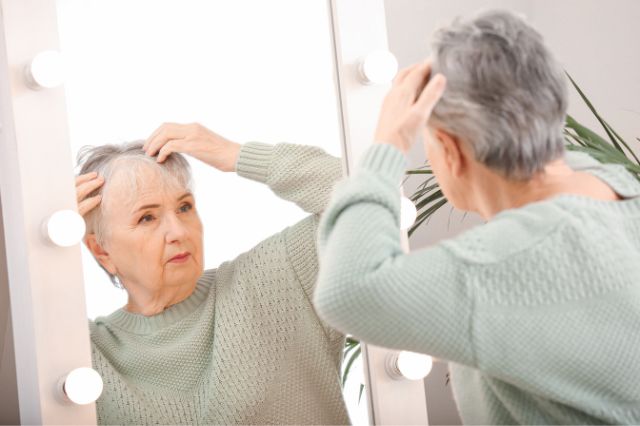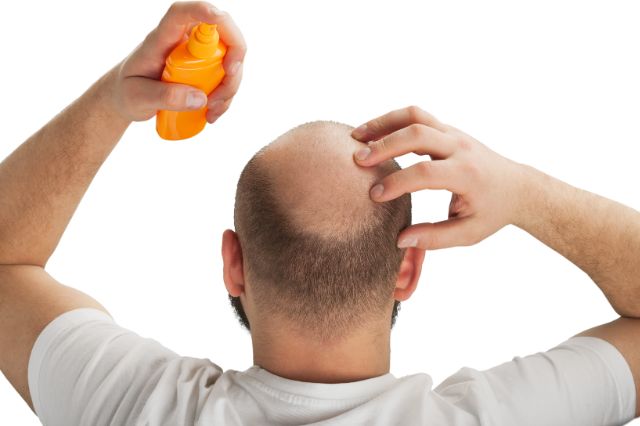Understanding Age-Related Hair Loss in Men and Women
- Written by Vivek Khullar
- Dec 2, 2023
- |
- 390 min read
 Listen to the full text
Listen to the full textAge-related hair loss is a common concern for all genders and is a natural part of aging. Since it can be hard for some to make sense of age-related hair loss, we decided to share everything critical about age-related hair fall, thinning, and damage.
In this blog, Lordhair - globally trusted for hair toupees and women's wigs - will talk about some causes and promising treatment options for age-related hair damage. Let’s start this blog with the basics of hair growth to better understand the loss!

Basics of Hair Growth
A hair strand goes through multiple stages before completing its life cycle. Here are the major phases:
Anagen phase: This is the active growth phase where hair follicles produce new hair.
Catagen phase: This is a transitional phase where hair growth slows and the hair follicle shrinks.
Telogen phase: In this phase, hair goes into resting mode and falls out to make way for new hair strands.
Now, let’s learn about the major causes of age-related hair loss in men and women in different phases of life
General Age-Related Hair Loss in Men and Women
Below are the major causes of age-linked hair loss in men and women:
Androgenetic hair loss: Commonly known as male pattern baldness, it is one of the most common causes of hair loss in men. This hair loss condition is triggered by genetics and hormone changes triggered by passing years. While hormonal fluctuations in middle age cause hair loss in men and women, some inherit a predisposition to hair loss from parents, and it can lead to the early onset of androgenetic alopecia.
Female pattern baldness: This age-related hair fall condition unfolds in a diffuse manner and leads to thinning of hair across the entire scalp. It is more common in postmenopausal women. While women usually experience FPB-related hair thinning in their late forties or fifties, it's especially heartbreaking for older women as regrowth becomes a big challenge for them.
Telogen effluvium: This is a temporary form of hair loss in men and women that is triggered due to a variety of factors including illness and stress. In the majority of cases, hair starts to grow back in three to six months without the treatment. Telogen effluvium normally lasts six months in young men and women but for older age groups, the recovery period can stretch to years. A nutrient-rich diet and a good hair care routine can help in boosting hair health.
Menopause: In women, menopause brings significant changes in hormone levels, and causes hair loss in a lot of cases. It often becomes challenging for women to cope with health challenges as well as hair damage. Following a healthy diet with omega-3 essential fatty acids and timely intake of B vitamins will help women provide the right building blocks for hair growth.

Other major hair loss causes in men as well as women are:
-
Stress
-
Nutrition deficiencies
-
Medical conditions
-
Poor hair care routine
-
Wrong choice of hair styling products
Hair loss due to these conditions can occur at any age but older people are often at high risk of encountering hair loss from them.
Poor dietary choices and not taking the right amount of nutrients (vitamins, proteins, and the rest) on board impact hair health in seniors and sometimes trigger chronic hair loss. Vitamin D and iron deficiencies can also aggravate hair loss in some men and women.
Here are some more resources for additional reading:
- Hormones causing hair loss and baldness
- Uneven hairlines in males and females
- Does the keto diet cause hair loss?
Now that we have a general idea of age-related hair loss and what triggers it, let’s learn about the best treatments for age-related hair thinning and damage.
Treatments for Age-Related Hair Loss
While age-related hair fall is particularly challenging to counter, below are some recovery recommendations that will come in handy:
Medications: FDA-approved medications such as minoxidil and finasteride can slow down hair loss and even trigger growth in some. However, avoid taking medications without consulting a dermatologist since they carry the risk of side effects.
Balanced diet: If your age-related hair loss has just started, making changes to your weekly meals can make a big difference. Start following a hair loss prevention diet to get all the essential nutrients to strengthen your hair from the inside. Adopt a healthy lifestyle and bring down stress as well.
Human hair systems: If your hair fall has led to big bald patches and major overall thinning, medications can’t resolve the problem. For men and women in advanced stages of hair loss, we recommend opting for non-surgical hair replacement systems (also referred to as hair toupees, men’s hairpieces, and women's wigs).
Recover from Age-Related Hair Loss
We hope that the above insights address your major queries about age-related hair loss in men and women. If your hair fall is in its early days or looks like a medical condition, it is best to visit your dermatologist for advice.
Thousands of men and women use non-surgical hair replacement units to recover from age-related hair damage. Check out our YouTube channel to discover how they work and change lives. Got any queries to ask? Drop them in the comments to get a quick reply from our hair experts.


